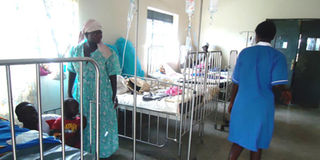Sensitise women on contraceptives

The United Nations Population Fund (UNFPA) notes that as much as universal access to reproductive health by 2015 is one of the targets of the Millennium Development Goals, most developing nations still have a long way to go.
UNFPA says some 222 million women worldwide who would like to avoid or delay pregnancy lack access to effective family planning.
In Uganda, only 26 per cent of married women use contraceptives, 34 per cent of married women have an unmet need for family planning, 21 per cent are in need of spacing while 14 per cent are need of limiting according to the Uganda Demographic Household Survey (UDHS) 2011.
Many women are still operating under a spell of myths and misconceptions about contraceptives, which has watered down efforts to promote their use.
Some of the key myths and misconceptions include rumours that contraceptives cause weight gain or harm her health, makes women become promiscuous”, and causes cancer”.
While it is true that all drugs, as well as contraceptives have side effects, medics agree that this notion has been blown out of proportion when it comes to contraceptives.
This calls for renewed efforts to meet women’s needs for information and high-quality contraceptive services.
It is, therefore, important that family planning information and services are made more available particularly to women in rural and hard to reach areas.
This is pertinent because family planning offers life-saving benefits to mothers and their children. Family planning also contributes to a range of development targets, including poverty reduction, gender equality, and environmental sustainability, as well as maternal and children’s health.
This, however, is only possible if women have access to adequate information about contraception.
Family planning programmes should, therefore, focus on eliminating myths and misinformation, while strengthening factual information of all stakeholders, including government, NGOs, health workers, leaders and men, have a role to play.
There is need for training and updating health workers on proper use of family planning because some health workers at times fuel misconceptions because of poor training and limited understanding of the available guidelines.
Health workers need to emphasize the fact that contraceptives are safe and are tailor-made for each woman, depending on her health condition and be open and tell clients about possible minor but rather manageable side effects.
[email protected]




